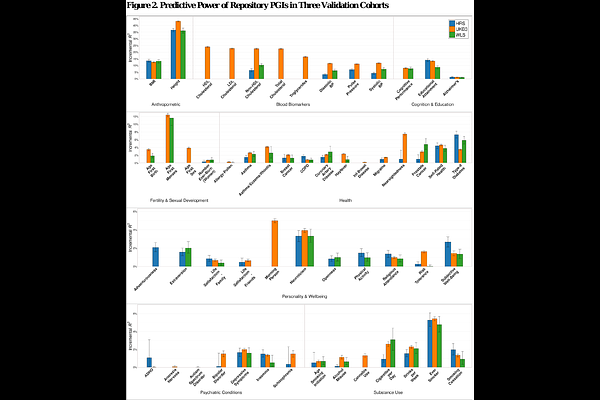An Updated Polygenic Index Repository: Expanded Phenotypes, New Cohorts, and Improved Causal Inference

An Updated Polygenic Index Repository: Expanded Phenotypes, New Cohorts, and Improved Causal Inference
Alemu, R.; Terskaya, A.; Howell, M.; Guan, J.; Sands, H.; Kleinman, A.; 23andMe Research Team, ; Bann, D.; Morris, T.; Ploubidis, G. B.; Fitzsimons, E.; Mullan Harris, K.; Caspi, A.; Corcoran, D. L.; Moffitt, T. E.; Poulton, R.; Sugden, K.; Williams, B. S.; Steptoe, A.; Ajnakina, O.; Vainik, U.; Esko, T.; Estonian Biobank Research Team, ; Campbell, A.; Hayward, C.; Iacono, W. G.; McGue, M.; Krueger, R. F.; Docherty, A. R.; Shabalin, A. A.; Hertwig, R.; Koellinger, P.; Richter, D.; Goebel, J.; Ahlskog, R.; Oskarsson, S.; Magnusson, P. K. E.; Harden, K. P.; Tucker-Drob, E. M.; Pahnke, C. K. L.
AbstractPolygenic indexes (PGIs) - DNA-based phenotype predictors for individual phenotypes - have become essential tools across the biomedical and social sciences. We introduce Version 2 of the Polygenic Index Repository, which expands the number of phenotypes from 47 to 61, increases the number of participating datasets from 11 to 20, and adopts a more consistent and improved methodology for PGI construction. For 16 phenotypes, we leverage summary statistics from an updated GWAS meta-analysis with greater statistical power compared to the original release, thereby improving the PGI\'s predictive power. To improve power for family-based analyses, we provide imputed parental PGIs in all datasets with first-degree relatives and we provide a framework for interpreting results from analyses that control for parental PGIs. Together, the updates improve predictive accuracy, expand coverage to new cohorts and phenotypes, and introduce novel tools that reduce confounding bias and improve interpretability.